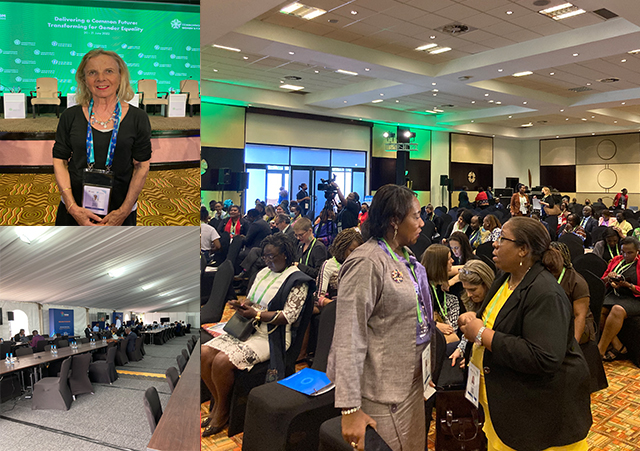 [top left, clockwise] Victoria Schofield, the Women's Forum and the media centre. [photos: Victoria Schofield]
[top left, clockwise] Victoria Schofield, the Women's Forum and the media centre. [photos: Victoria Schofield]
It took about nine hours flying time – with some waiting in between – to reach the heart of Africa, as the scenery beneath me changed from the cultivated fields and ordered cities of Europe, across the Mediterranean sea, to the tropical expanse of the sub-Saharan African continent, crossing the Equator at Uganda and Kenya. Of the Commonwealth’s 54 member countries, nineteen are African – over a third – spanning territory from west to east and north to south, resplendent in their own diversity, most visually evident in the women’s colourful clothes. As I’d already discovered by perusing my giant atlas, Rwanda is a small country even by comparison with neighbouring Uganda, let alone its’ giant neighbour to the west, the Democratic Republic of the Congo [DRC, formerly known as Zaire].
On touching down in Kigali, the first instruction, which was a reminder of Rwanda’s progressive policy to protect the environment, was over the loudspeaker forbidding all entrants to bring any plastic bags into the country. But it wasn’t until the following morning that I could see how far Rwanda has come in its development. ‘We are all Rwandan now,’ Eric, my taxi driver, assured me as he picked me up from the Hotel des Mille Collines, where I’m staying (the real-life location for the Hotel Rwanda, the emotive film telling the story of the 1,000 plus who sheltered there during the 1994 genocide). And it was clear that the most important event of the week for Kigali’s 1 million inhabitants was the city’s total takeover by CHOGM, banners with ‘CHOGM RWANDA2022’ adorning the lamp posts, and the major hotels sporting the varied flags of the member countries.
A distance away at Intare, the Youth’s Forum was already going strong, thousands of proud young people coming together to proclaim that they were ‘Taking charge of our future’. Meanwhile at the Serena Hotel, the Women’s Forum, with the theme ‘Delivering a Common Future: Transforming for Gender Equality’, had opened, the keynote speech given by Rwanda’s first lady, Her Excellency Jeannette Kagame. ‘We are facing,’ she said ‘a multitude of crises, which only deepen the gender gap….the statistics are uncomfortable, but over half of women in the world have experienced, or know someone who has experienced, gender based violence.’ Memorable among the interventions I heard on livestream were the remarks of Shabana Basij-Rasikh, founder of the only girls boarding school in Kabul, SOLA, Afghanistan, which last year – following the August 2015 takeover by the Taliban – has relocated to Rwanda. ‘We have to speak with the loudest voice and demand change. We cannot afford to waste time. Years of study has proved that we need girls’ education to eradicate poverty.’
Before being able to attend any forums, my first port of call was the BK Arena for ‘badge collection’ helped by Peace (yes that was her real name!), where I also had to take another Covid test, and then go to the Kigali Convention Centre to familiarise myself with the Media Centre. As I’d already realised, unlike London in 2018 where I could easily attend sessions for all Forums choices had to be made, and I decided to pick up on the proceedings of the Women’s Forum. This time my taxi driver, Dieudonné, was French speaking and repeatedly reminded me that I was ‘bienvenue’ in his country, thoroughly delighted by my praise of the clean streets and well-manicured gardens, as we swept past on our way to the Serena.
When I got to the Women’s Forum, the session on ‘Women’s Economic Empowerment’ was about to begin. The VVIP guests had all left but this did not detract from the speakers’ words and sentiments. ‘Covid hasn’t done women any favours,’ Professor Sangeeta Khorana reminded the audience, warning that the gender gap may increase, ‘The key to economic empowerment is keeping girls in school,’ a member of the audience proclaimed. Breakaway sessions ‘Engaging men and boys: ending violence against women and girls,’ and an ‘Intergenerational celebration’ followed. Both were important topics and yet again I had to make a decision, my choice falling on listening to the ‘global priority’ of eliminating violence against women and girls because ‘children who grow up with violence are more likely to become perpetrators or subjects of violence,’ said the moderator, Sneh Aurora, Director of the Commonwealth Human Rights Initiative, in her opening remarks. ‘Research has shown that violence against women is closely linked with the power imbalance between men and women.’ ‘We also have to listen to the silences because that reflects the story,’ said Samitha Sugathimala from Sri Lanka, Regional Coordinator for MenEngage Alliance.
By the time the sessions for the day had finished, my take-home message to move forward was the colossal importance of translating words into action.
Next up –the People’s Forum.
Victoria Schofield is the chair of the Round Table editorial board.
Related articles:
Kigali notes: CHOGM Diary from the Round Table Chair – departure



